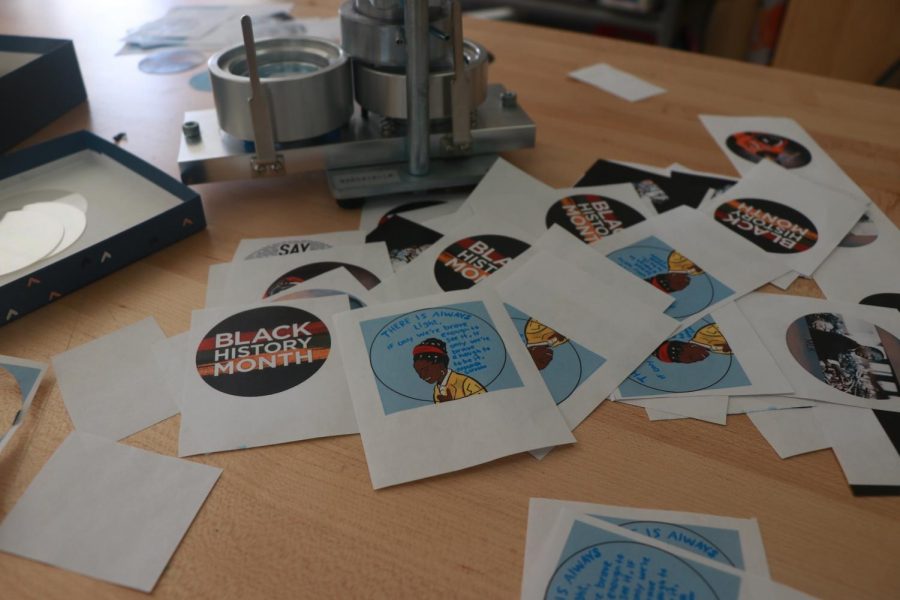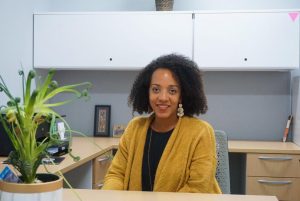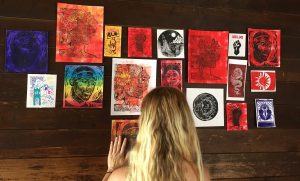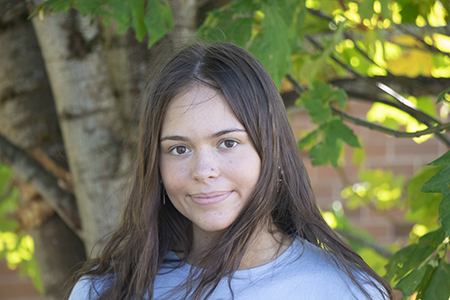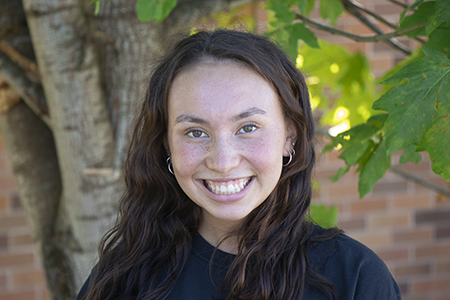Through Celebrating Black Excellence, Appreciating Diversity, and Practicing Empathy, BSU Leads School in Commemorating Black History Month
“We’re proud to be people of color.”
With the help of Design Thinking teacher Ms. Carie Coleman, the Black Student Union is creating pins and posters to celebrate Black History Month.
February 3, 2021
Since 1976 when former President Gerald Ford officially recognized Black History Month, February has been a time to celebrate and honor the contributions of Black Americans in politics, art, activism, medicine, education, and other areas throughout the nation’s history, as well as in contemporary times.
This February, with the recent inauguration of Kamala Harris — the first Black, Asian-American, and female U.S. Vice President — and the widespread Black Lives Matter protests that took place throughout the past year, conversations around racial justice and equity have escalated to the forefront of national dialogue, garnering attention as a primary issue alongside the election and pandemic.
At La Salle, members of the Black Student Union, along with some teachers and staff, are making efforts to celebrate the month within the community, educate about Black history, and encourage conversations around equity.
“Black History Month is just kind of a time for the community to come together and celebrate our culture and who we are as people,” junior and BSU secretary Nyah Torbert said. “And then, to also show the rest of the world who we are. And I think that it’s especially important this year, because we’ve been fighting for social justice… for the past seven months now, and there’s still a lot of work that we’ll be doing in the future, and it’s definitely not over. But I think it’s important for us to be able to take a break and remember that we’re proud to be people of color, and that we should be able to celebrate and to be happy and not to just feel like we have to constantly fight for our lives.”
The BSU, alongside Director of Equity and Inclusion Ms. Kiah Johnson Mounsey, has a number of virtual events planned for the community during February, including a talk led by award-winning author Renée Watson and performances and workshops by slam poet S.C. Says.
“I’ve had the opportunity to work with [S.C. Says] before,” Ms. Mounsey said. “He has been such an amazing human being [in] many different ways… He’s able to connect with young people.”
In addition to these events, Director of Service Ms. Sarah Maher is helping to coordinate a panel that will discuss Black excellence, and Design Thinking teacher Ms. Carie Coleman is working with the BSU to create posters and pins.
“The posters and buttons have important messages or figures from history that were involved in things like the Civil Rights Movement or Harlem Renaissance,” sophomore and BSU treasurer Nicholas Hounton said.
Much of this planning has been led by the BSU, aiming to focus “on the achievements — the greatness — that folks have done, and highlighting that,” Ms. Mounsey said.
“They started this conversation very early on,” Ms. Mounsey said. “I was actually really, really impressed… It’s been a few months, at least, that they started thinking about Black History Month. So whatever their hopes and goals are, I want to help or facilitate in any way that I can.”
Ms. Mounsey said that one important part of Black History Month is “being curious” and “exploring people or resources or books or articles or even videos” about racial equity issues and Black contributions to society.
“I think it’s really important as educators to allow students to have these conversations, to provide space, and to be OK with the fact that they may not know everything, and they may be uncomfortable, and that’s OK,” she said. “Sometimes I feel like fear can be such a driving force of what happens or what is said in the classroom and what doesn’t.”
She also said that it’s important to teach and learn “the complete history,” meaning not just the Black history that is rooted in slavery and disenfranchisement, but also the many ways in which Black people have enacted necessary change and made meaningful impacts on every aspect of society despite centuries of systemic injustice.
“When Black history was talked about when I was growing up, essentially, there was such a huge focus on slavery and segregation, and just other forms of oppression,” Ms. Mounsey said. “And while that is important to know, to recognize, and acknowledge, it just provides a really narrow view of Blackness, and it just perpetuates this false notion of… inferiority.”
For junior and BSU public relations officer Simon Abraha, he finds that it’s essential to recognize that Black people have helped pave the way towards societal progress and improvement.
Speaking about figures like Dr. Martin Luther King Jr. and Malcolm X, he said, “I think it’s not fair to not bring up their names and what those people have done.”
“It’s just essential to give them their credit,” Abraha said, “because without them, who knows? We would probably still be stuck in the past and somewhere we definitely don’t want to be. I think it’s good to give them our thanks and credit for where we’re at right now and how we’re striving using their ideologies and their philosophies.”
Similarly, Hounton believes that Black History Month is a time to honor influential Black leaders and contributors, while also recognizing current issues.
“There’s a lot of bad things going on right now,” he said. “But with Black History Month, I think it’s both a time to underline what’s going on, but also remember the Black excellence that we’ve had in different figures, and what they’ve done for us to help move forward against racism, and also make sure that everyone is equal, regardless of their skin color.”
A large part of Black History Month, Ms. Mounsey said, is celebrating Black excellence by honoring the strides that have been made by Black people in both the past and the present — strides not just for the Black community, but for the country altogether.
“Black history is American history,” Ms. Mounsey said. “Black folks have touched and impacted all areas of our current society.”
For Torbert, celebrating Black excellence is not only about influential figures, but also about honoring Black culture and identity, in others and in herself.
“For a long time, we were taught to hide our culture or hide who we were,” Torbert said. “We’re taught not to be who we are, or to try to fit in more to society. And so, I think that when we’re talking about Black excellence, it’s about being able to embrace who we are and where we come from, and our heritage.”
While the BSU spends time focusing on larger issues and events, the group has also built a close camaraderie through conversation about everyday life, experiences as students of color, and ways to improve equity at La Salle.
“I think that it’s really important that a school like La Salle has a community like this, because there aren’t many students of color at our school, and especially not Black students,” Torbert said. “We all kind of relate in a special way, and we’re able to communicate our thoughts and concerns and our experience at a predominantly white school.”
Abraha spoke similarly, saying that the BSU can sometimes serve as an “escape.”
“When you’re in class and you’re the only Black kid in the class out of, what, 20 white people, it’s just like you can’t relate a lot,” he said. “But when you’re in a room with BSU… you can just express yourself the way you want to without feeling like somebody might criticize you.”
The BSU acts not only as an affinity space for students of color, but also as a channel for its members to better the La Salle community as a whole.
“We just drive to improve our school and improve the world I guess,” Abraha said. “That’s who we are, that’s what we do.”
***
Stay tuned to The Falconer this February for further coverage of Black History Month.


